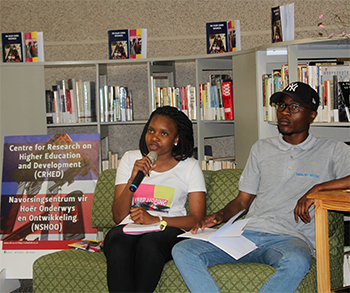Latest News Archive
Please select Category, Year, and then Month to display items
![]()
The National Research Foundation (NRF) ratings are considered the benchmark for research excellence. This year the University of the Free State (UFS) has 17 newly NRF-rated researchers. This brings the total number of NRF-rated researchers at UFS to 160.
NRF ratings are allocated based on a researcher’s recent research outputs and impact as perceived by national and international peer reviewers. The rating system encourages researchers to publish high-quality research papers in journals of high impact and to publish books through reputed academic publishers. The NRF rating system is a valuable tool for benchmarking the quality of our researchers against the best in the world.
Research at the heart of the UFS
Prof Francis Petersen, Rector and Vice-Chancellor, has indicated that the UFS provides significant support to researchers to apply for new NRF ratings or to re-apply for rating. These initiatives include the mock NRF rating panels managed by the Prestige Scholars Programme (PSP), evaluation of individual research outputs and recommendations on timely applying for rating, and improvements on rating applications by a panel consisting of internal and external members. These initiatives are bearing fruit by increasing the number of rated researchers who will transform the research profile and increase the diversity of UFS researchers.
Cultivating the best researchers.
According to Eleanor van der Westhuizen, from Research Development: “The rating of individuals is based primarily on the quality and impact of their research outputs over the past eight years, taking into consideration the evaluation made by local and international peers. It identifies researchers who count among the leaders in their fields of expertise and gives recognition to those who have a sustained production of high-quality research outputs. Several South African universities use the outcomes of the NRF evaluation and rating process to position themselves as research-intensive institutions, while others such as the UFS provide incentives for their staff members to acquire and maintain a rating.”
Cream of the crop
The UFS has also upped the ante with regard to its total number of NRF-rated researchers during the latest rating and evaluation, with an increase from 149 to 160 rated researchers in 2018.
Prof Heidi Hudson, Dean of Humanities, received an NRF B-rating, which brings the total of B-rated researchers to six. Other B-rated researchers incude Prof Johann Meyer (Mathematics), Prof Fanie Snyman and Prof Francois Tolmie (Theology), Prof Felicity Burt (Medical Microbiology) and Prof Andre Roodt (Chemistry). A total number of 10 new C-ratings and six new Y-ratings were achieved during the 2018 evaluation process.
“NRF-rating is indicative of the university’s drive to enhance its research profile nationally and internationally. Congratulations to all the scientists and scholars who received a rating in 2017. I am thankful to our academics for their commitment to the rating process,” said Prof Corli Witthuhn, Vice-Rector: Research at the UFS.
Literacy Month fosters the love of reading
2017-09-19

Vutivi Baloyi author of Keep Hoping with Neo Kgoroba
one of the co-authors of In Our Own Words.
Literacy Month is celebrated in September each year at the University of the Free State (UFS) with various activities that are academic and community related and aim to join different departments in collaborative efforts to carry forward an awareness of literacy and the joy of reading among learners. The UFS Sasol Library lined up a series of events to celebrate the month, one of them being the launch of two books on 14 September 2017.
Vutivi Baloyi is a UFS student who wrote a collection of poems at the age of 17 which were recently published in a book called Keep Hoping. The book was launched alongside In Our Own Words, a collection of narratives written by UFS students about university life and transitioning from township high schools to a different culture, society and community, and the challenges with which they are faced.
In their own words, they share incredible experiences
The launch was attended by learners from Christian Liphoko High School in Thaba Nchu as well as Moroka High School and others. The compilation of narratives by UFS students was done under the auspices of Prof Merridy Wilson-Strydom through the Enabling Success project in the Centre for Research in Higher Education. Prof Wilson-Strydom said the project, supported by the National Research Foundation, was a profound way of empowering students by bringing out the value of the stories of their life on campus as they saw them, with each student writing a chapter on a specific theme.
Students as change agents and community builders
The student authors spoke to their audience from the heart, sharing words of advice, especially to younger learners who are still in high school. This has sparked a desire for the beginning of collaborative programmes between the individual university students and high school learners who hail from Botshabelo and Thaba Nchu, highlighting the need for mentorship, life skills, academic improvement and an opportunity to give back.
The event is also part of the ongoing Launch Your Own Book project that has grown in 2017 at the UFS Library under the leadership of Mr Marcus Maphile, Assistant Director: Library Marketing and Community Engagement. Literacy Month will be celebrated with more events in September such as a round-table discussion in collaboration with the Academic and Non-Fiction Authors Association of South Africa (ANSAFA) on 20 September 2017 at the library, to discuss developing authors and the role of ANSAFA. More activities will include outreach and community engagement, with a visit to Christian Liphoko High School in Thaba Nchu on 21 September 2017.